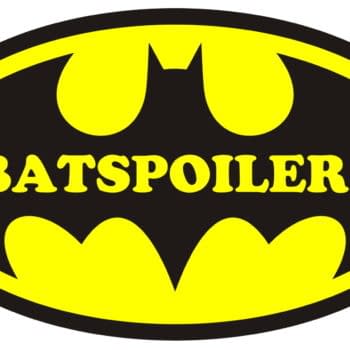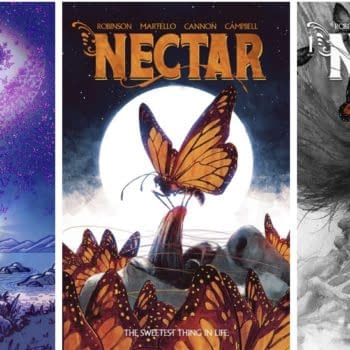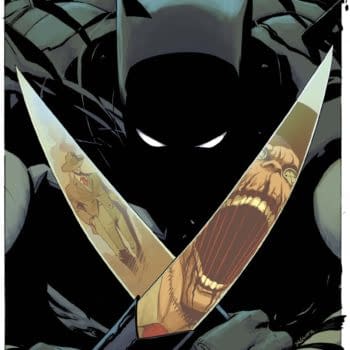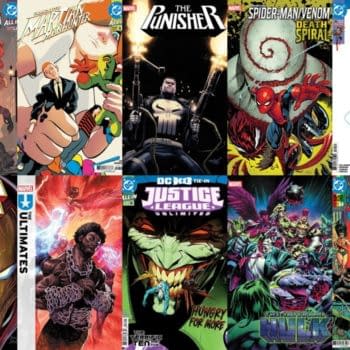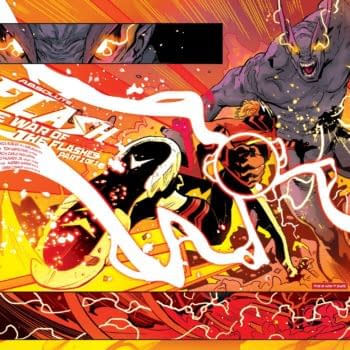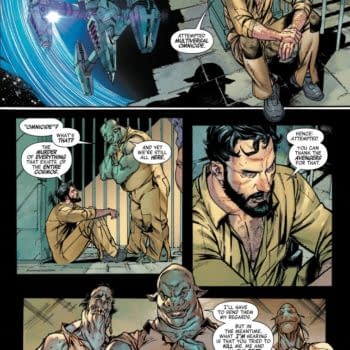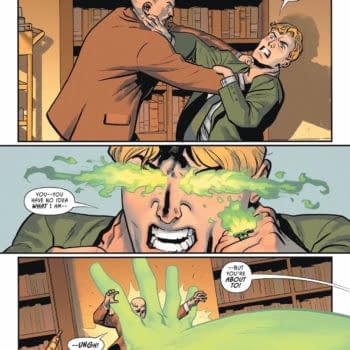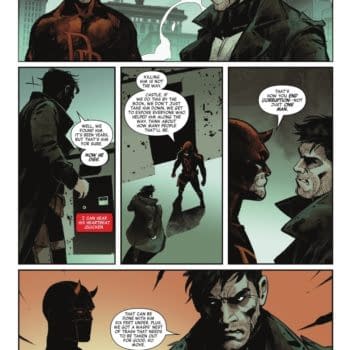Posted in: Comics | Tagged: black, Comics, comics code, entertainment, michael davis, michaeldavis, milestone
Code Black – Michael Davis, From The Edge

In 1956 the two-year old Comics Code Authority (CCA) tried its best to stop EC Comics from publishing a particularly offensive comic book. Founded in 1954, as part of the Comics Magazine Association Of America the CCA was created in answer to an uneasy American public fed up with gruesome, shocking images and stories in comics.
Simply know as "the code" within the field, the CCA took to the task of cleaning up the comic industry like the new sheriff in town taking to the task of ridding said town of whore houses so decent people could live in peace. The Comics Code just would not stand for America's sons being subjected to the evils of comic books. EC Comics was among the top targets the moment the code was formed.
Pushing the limits of what at the time was considered obscene was nothing new to the publisher of explicit horror books. The mainstay content of EC was carnage, viciousness, crime and a productive heaping of gore thrown in for good measure.
To some, an above-reproach case could be made even today that EC was glorifying criminals and their actions as well as violence for the sake of such. This, years before we see the same argument being used against Rock and Roll and decades before we see it used against Rap and Hip Hop music. Crime and violence aside, the Comics Code also took great offense at sex. To be fair, what would the 1950s be without someone objecting to sex?
With the moral backdrop of the 50s and the onslaught on standards deemed obscene by mostly old white men regarding everything from juvenile delinquency to portraying married couples in the same bed on TV its no surprise there were senate hearings on comic books. Those hearings, spurred on in no small measure by Dr. Fredric Wertham's book, Seduction of the Innocent, took place April 21, April 22 and again on June 4, 1954.
Wertham's book said in effect that comics would lead America's kids down a path ripe with crime, violence, homosexuality and a hated for all things patriotic. It was clear to Wertham and he made it clear to the rest of America, if your kids read comics they would most certainly end up anti-American queer murderous criminals.
Because of Wertham, his book and the Senate investigations less than three months after the hearings ended the comics industry decided to regulate itself in advance of Congress doing it.
So, enter the code.
What's completely overlooked in the sanctification of the 1954 Senate hearings on comic books is how they dealt with race. The thunderous judgment most people took away from the hearings was the focus on sex, crime and violence.
Almost hidden in the interim report on Comic Books and Juvenile Delinquency was a passage on racial stereotypes.
The following passage from the Comics and Juvenile Delinquency interim report of the committee on the judiciary/ a part investigation of Juvenile Delinquency in the United States:
One example of racial antagonism resulting from the distribution of American-style comic books in Asia is cited by the former United States Ambassador to India, Chester Bowles, in his recent book, Ambassador's Report. He reports on page 297 the horrified reaction of an Indian friend whose son had come into possession of an American comic book entitled the Mongol Blood-Suckers. Ambassador Bowles describes the comic book as depicting a-superman character struggling against half-human colored Mongolian tribesmen who has been recruited by the Communists to raid American hospitals in Korea and drink the plasma in the blood banks. In every picture they were portrayed with yellow skins, slanted eyes, hideous faces, and dripping jaws.
At the climax of the story, their leader summoned his followers to and attack on American troops. "Follow me, blood drinkers of Mongolia," he cried. "Tonight we dine well of red nectar." A few panels later he is shown leaping on an American soldier with the shout, "One rip at the throat, red blood spills over white skins. And we drink deep."
Ambassador Bowles commented: The Communist propagandists themselves could not possibly devise a more persuasive way to convince color sensitive Indians that American believe in the superior civilization of people with white skins, and that we are indoctrinating our children with bitter racial prejudice from the time they learn to read.
13 Bowles, Chester, Ambassador's Report, New York, 1954, p. 297.
It's refreshing to see that some American lawmakers in the 50s were concerned about racial stereotypes, at least in principal if not in practice.
Ambassador Bowles statement really underscored that as Americans we would not tolerate any sort of racial bigotry. Yes, his remarks were hidden in the body of a report that focused on crime, sex and violence but they were there nevertheless.
Because of the public outcry caused by the hearings the CCA was enjoying major influence over the comics industry. When they began calling the moral shots in the comics business most publishers bent like a weed in the wind under the pressure. Some publishers simply adapted some cancelled books and a few went out of business altogether.
Above all else the CCA was intended to be a moral angel sent from above. The task made easier as this was that America after World War II, a country faced with many ethical dilemmas. The youth of America had returned from war but no longer were they young.
They were a hardened group of men and women who were determined to steer their children in the right direction in the choice between rather America would be a Heaven or a Hell for their children.
Heaven was the America they just fought for.
Baseball, Hot Dogs, Apple Pie and Chevrolet.
Hell was the impending darkness of the Communist menace.
By 1954 the Red Scare was firmly in the mind of the American psyche. The Red Scare with its focus (mostly imagined) on the United States of America being infiltrated and ultimately taken over by Communism. These were the issues that kept the good citizens of this great nation up at night. If they were not kept up all night dreading the coming apocalyptic death of the American Dream they would be as soon as they heard Senator Joe McCarthy.
McCarthy's crusade against subversion and espionage within the United States government made him at one point arguably the most powerful man in America. Certainly the most feared.
At the height of the Red Scare, Julius and Ethel Rosenberg, a couple which at that moment in time were more hated than Adolf Hitler, were executed for selling the secrets of the atomic bomb to the Russians. If nothing else, the electrocution of two people who looked like your next-door neighbors certainly brought the message home. The event, based upon evidence many (but not all) find dubious, made the Communist menace a clear indication of impending disaster.
America had its hands full with impending doom, sex, crime and violence. They had to protect the kids by any means necessary.
Makes you glad that 1954 is light years, and real decades from the America of 2014. I mean who would cast that sort of McCarthy like crazy shit out there now a day eh?
Give that a sec.
In 1954 this concentration on moral outrage did not leave a whole lot of time or interest to focus what many thought were second-class American citizens, African Americans. Funny, considering that treatment of African Americans was exceedingly immoral.
Next week, part two.
Previously published elsewhere edited for Bleeding Cool






